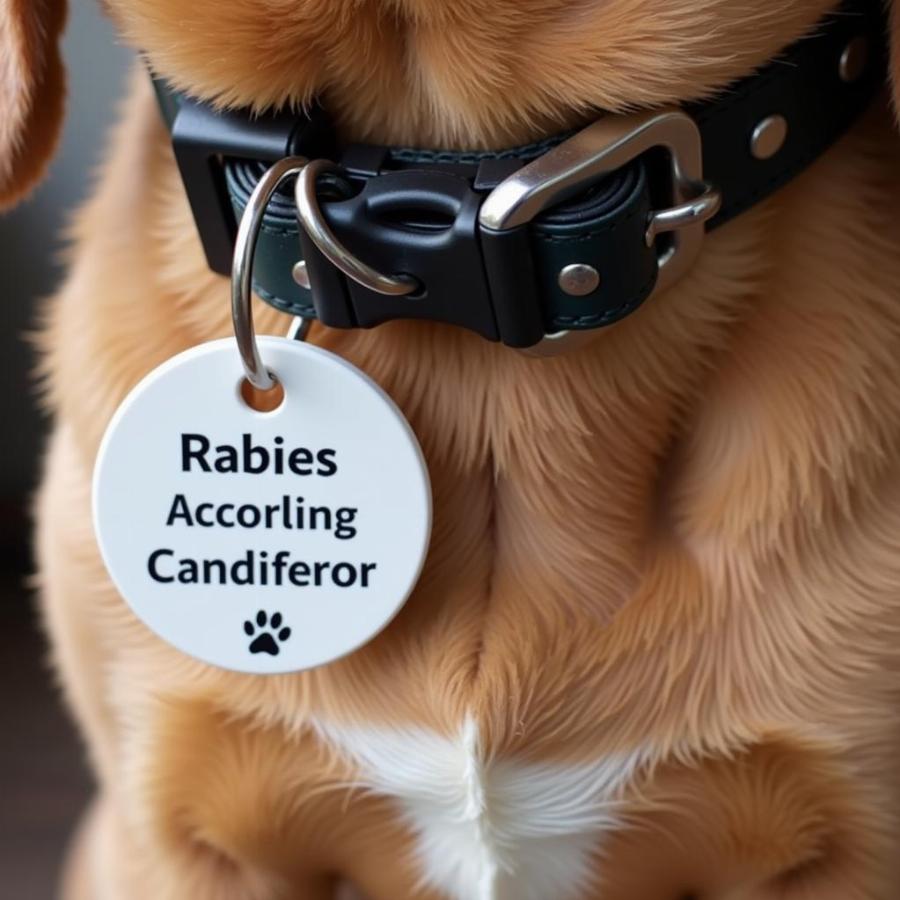Protecting your furry friend from rabies is crucial, and knowing the right time to vaccinate plays a vital role. While the answer to “what age can a dog get a rabies vaccine” might seem straightforward, understanding the nuances can ensure lifelong protection for your canine companion.
Typically, puppies receive their first rabies vaccine around 12 to 16 weeks of age. This initial dose kickstarts their immunity against this deadly disease. However, factors like local regulations and your puppy’s health might influence the exact timing.
Deciphering Rabies Vaccination Schedules: Why Age Matters
A puppy’s immune system is still developing in its early weeks. Vaccinating too early can be ineffective as maternal antibodies, passed through their mother’s milk, might interfere with the vaccine’s efficacy. Waiting until they are around 12 weeks old allows their immune system to mature, ensuring the vaccine can trigger a robust immune response.
The Importance of Booster Shots: Keeping Protection Strong
After the initial rabies vaccine, your dog will need a booster shot a year later. This booster shot reinforces their immunity and provides continued protection. Following this, rabies vaccination frequency varies, with some areas requiring annual boosters while others allow vaccinations every three years.
Beyond the First Year: Rabies Vaccination Throughout Your Dog’s Life
Consult your veterinarian to determine the best rabies vaccination schedule for your dog based on your location and lifestyle. Remember, even if your dog is up-to-date on their rabies vaccinations, it’s crucial to keep them away from wild animals and report any potential exposure to your veterinarian immediately.
State Laws and Rabies Vaccinations: What You Need to Know
Rabies vaccination isn’t just about your dog’s health; it’s also the law in many states. These laws help prevent the spread of rabies and protect both animals and humans. Make sure you’re familiar with your state’s regulations regarding rabies vaccinations for dogs.
 Dog Rabies Tag on Collar
Dog Rabies Tag on Collar
Recognizing Rabies Symptoms: When to Seek Immediate Veterinary Care
While we strive to prevent rabies through vaccination, it’s essential to recognize its symptoms. If your dog exhibits sudden behavioral changes, excessive drooling, paralysis, or difficulty swallowing, contact your veterinarian immediately.
“Early detection and treatment are critical when it comes to rabies,” says Dr. Emily Carter, a veterinarian specializing in canine infectious diseases. “If you suspect your dog might have been exposed, don’t wait to seek professional help.”
Rabies Vaccination: A Small Step for a Big Impact
Getting your dog vaccinated against rabies is a simple yet powerful act of love and responsibility. By following the recommended vaccination schedule and staying informed, you’re not only safeguarding your furry friend but also contributing to public health.
Frequently Asked Questions
1. What happens if my dog misses a rabies booster shot?
Don’t panic! Consult your veterinarian as soon as possible. They might recommend a booster shot right away to ensure continued protection.
2. Are there any side effects to the rabies vaccine?
Like any vaccine, rabies vaccines can sometimes cause mild side effects like lethargy or soreness at the injection site. These usually subside within a day or two.
3. Can my senior dog still get vaccinated against rabies?
Yes, even senior dogs need protection against rabies. Your veterinarian will assess your senior dog’s health to ensure they can safely receive the vaccine.
4. Is the rabies vaccine effective immediately after vaccination?
It takes a couple of weeks for your dog’s body to build up full immunity after the rabies vaccine.
5. Can indoor dogs skip the rabies vaccine?
While indoor dogs might have a lower risk of exposure, it’s still crucial to vaccinate them against rabies. Accidents happen, and it’s always better to be safe than sorry.
Explore More About Dog Health
Beaut Dogs is your trusted source for all things dog-related. We’re passionate about providing dog owners with accurate and insightful information to help them provide the best care for their furry companions. For personalized guidance on rabies vaccination and other dog health concerns, reach out to us at [email protected]. Let’s work together to keep our canine companions happy, healthy, and protected.